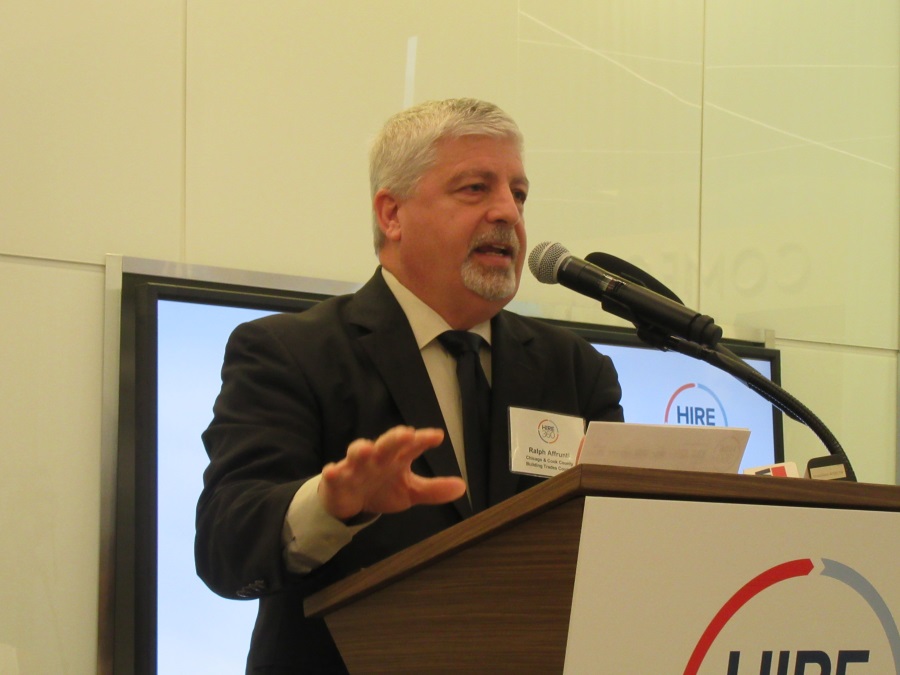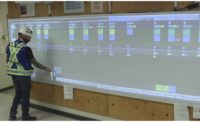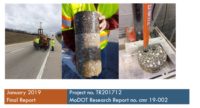Labor unions, the biggest developers and general contractors in Chicago, the Associated General Contractors of America's Chicagoland branch, the Chicago and Cook County North America's Building Trades Unions and the United Way all came together to launch a new group aimed at increasing minority and women participation in the construction process.
The initiative, named HIRE360, was introduced on December 9 at a press conference with speeches from Don Biernacki, senior vice president of construction at Related Midwest and the chairman of HIRE360's board; Ralph Affrunti, president of the Chicago & Cook County Building Trades Council; Mike Meagher, president of James McHugh Construction; Charise Williams, director of external affairs at the Chicago Federation of Labor and HIRE360's executive director Jay Rowell, a former director of the Illinois Department of Employment Security and deputy state treasurer.
"What HIRE360 is going to do, and why we believe is different is because we look at [workforce development from labor, contractors and developers] not as siloed activities, but more importantly as an ecosystem," Biernacki said at the Vista Tower site.
Rowell said that HIRE360 has a budget of $1.7 million for 2020 which he hopes will increase to $7 million in year two. A grant of $1 million came from the state of Illinois while the rest was pledged by the companies and unions involved. The contractors participating include McHugh, Pepper Construction, Power Construction, Clayco, Clark Construction, Lendlease and W.E. O'Neil Construction. The developers are Related, Magellan Development Corp., Farpoint Development, Riverside Investment and Development, Sterling Bay and Lendlease's development arm. Rowell said he has already hired a staff of six who will work in an office on Chicago's near south side and that there are plans to open offices elsewhere in the city and in the suburbs.
Rowell said the organization's goal is to get more involvement in both construction and the small business entrepreneurship that supports it, with a focus on getting african-americans, latinos and women, traditionally underrepresented groups, into the fold but also stressed that the initiative will take interested applicants that aren't from those groups.
"We’ll work with anyone, but those are the groups we’re focusing on," he said.
HIRE360 Wants to send thousands of candidates to apprenticeships, Rowell said there are 3,500 open slots for apprenticeships in Chicago Federation of Labor unions the area right now. He also said HIRE360 wants to start an incubator to help form and fund new minority- and women-led businesses. He said the initiative will do everything from helping candidates train for tests to buying boots and other clothes necessary for work on a jobsite. The HIRE360Chicago.com website is up and taking applications and giving skills assessments to potential applicants.
"Coaching, mentoring, HIRE360 will be with you every step of the way," Williams said. "I like to say that I'm like your uncle in the trades."
By bringing major players together into one organization, Biernacki and the other board members said they believe they can create opportunity for a long-term pool of new workers. Many of the major players began talking about such a hiring initiative in 2016 when Affrunti and other labor officials went to Milwaukee, Wis., to see what they could learn from an initiative called WRTP/Big Step created for several projects at Chicago's neighboring city. The labor leaders liked what they saw, but wanted something on a larger scale.
"They were just dealing with the brewery and John Deere and putting people to work there," he said. "We're dealing with many of the biggest developers and contractors here and that makes a huge difference. A lot more people work that way. It's a unique partnership."
From there, Affrunti, Biernacki, Meagher, Williams, Pepper Construction President Ken Egidi and several other leaders met at one table and a pilot program that eventually became HIRE360 was created.
"I have attended every meeting in the last 16 months," Meagher said. "The commitment that our union, developer and contractor partners have made is unmatched. And here's something that I've never said before, I am grateful to my industry competitors."
One of the first applicants for the pilot program was Calvin "C.J." Jenkins, owner of Community Playlot Builders, a playlot builder and custom carpentry subcontractor who received a $100,000 low-interest loan from the program to start his business through the pilot program. Jenkins grew up in the Henry Horner Homes near Chicago's United Center and explained that the initiative helped him turn his life around. Jenkins mentioned his upbringing in that community and his involvement with street gangs and how getting a hand up through the pilot program helped him.
"They didn't just take a person that came from just a low community and change them," he said. "They took a person that was the worst of the worst, in those days, and now they've turned him into one of the best of the best."






Post a comment to this article
Report Abusive Comment